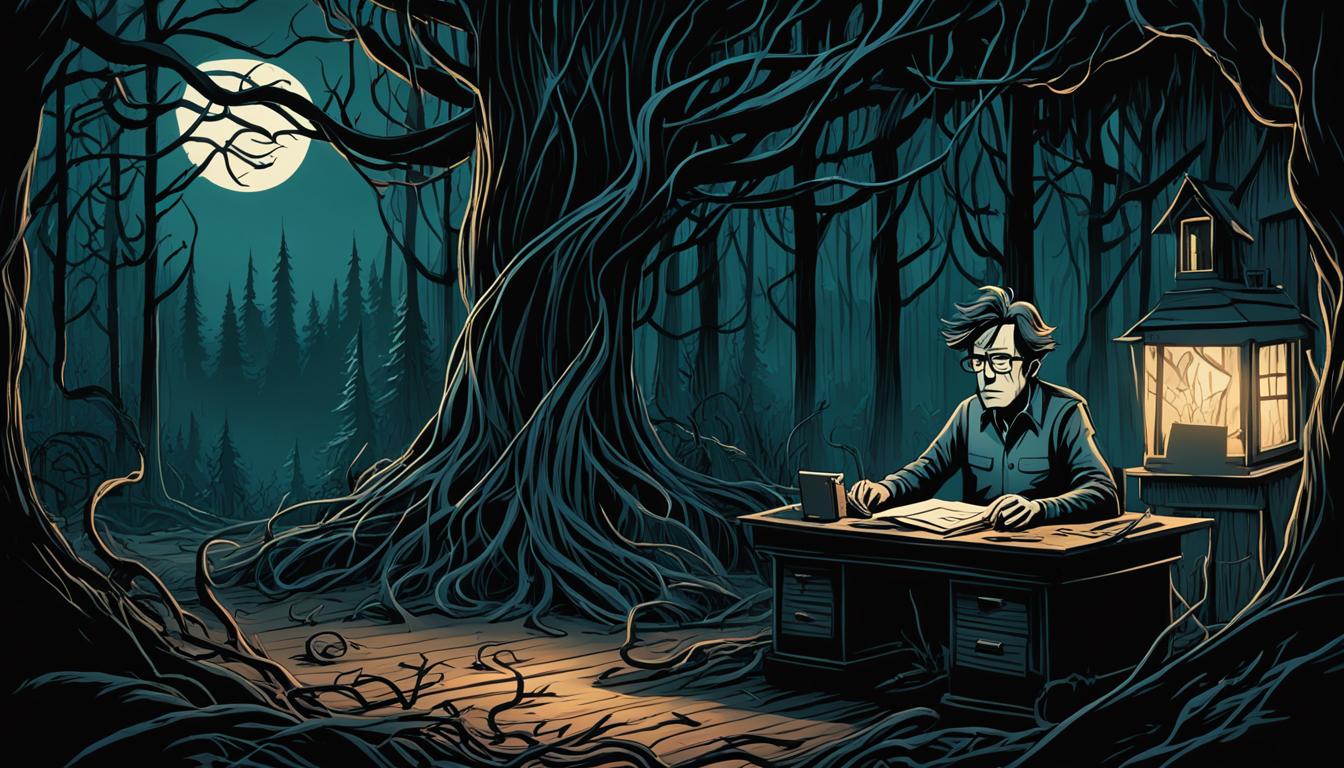Stephen King, known for his chilling horror novels, also possesses a lyrical genius that often goes overlooked. His poems offer an intimate reflection of his exploration of the human psyche and fantastical realms.
Even if you’re not a fan of horror, Stephen King’s poetry may surprise and delight you. His poems are a beautiful blend of artistry and symbolism that highlight his talent as a writer.
Key Takeaways:
- Stephen King’s poetry showcases his lyrical genius
- His exploration of the human psyche and fantastical realms is evident in his poetic works
- Stephen King’s poems are a beautiful blend of artistry and symbolism
- His poetry may surprise and delight even those who are not fans of horror
- Stephen King’s talent as a writer extends beyond his horror novels
The Artistry of Stephen King’s Poetry
Stephen King may be renowned for his spine-chilling horror novels, but his poetic works offer a breathtaking glimpse into his artistic genius. His poems are characterized by a unique poetic style that seamlessly blends the fantastical with the ordinary, making them a delight to readers of all genres.
What sets Stephen King’s poetry apart from other writers is his artistry that is reflected in his attention to detail, use of vivid imagery, and symbolism.
“Poetry is a way of communicating, it’s a way of talking to people, and it’s my way of being grateful for being alive,” said King in an interview.
King’s attention to detail allows him to create a visualization of situations and scenes in his reader’s mind. He often uses metaphors, similes, and other techniques to craft well-crafted verses that linger in the reader’s imagination.
Another striking element of his poetic writing is his use of symbolism. Stephen King’s poetry showcases his ability to paint vivid imagery that functions not only to describe but also to illustrate underlying meanings. His imaginative use of symbolism has become a signature element of his work, making his poetry a visual treat.
Stephen King’s poetic style demonstrates his artistic prowess, making his works a testament to his literary talent.
Exploring the Human Psyche in Stephen King’s Poems
Stephen King’s poems offer a fascinating exploration of the human psyche, delving deep into themes of fear, inner turmoil, and darkness. From the haunting imagery of “The Dark Man” to the visceral intensity of “The Bone Church,” King’s poetry provides a chilling look into the complexity of the human mind.
Through his works, King examines how our fears and vulnerabilities shape our thoughts and actions, exploring the depths of human emotion through his impactful and vivid writing. His keen eye for psychological detail and his willingness to delve into the darkest corners of the human psyche make his poetry a captivating and thought-provoking read.
Whether he’s exploring the horrors of addiction in “The Little Green God of Agony” or delving into the twisted nature of obsession in “For Owen,” King’s poetry invites readers to take a journey into the depths of the human soul. With his unmatched talent for both storytelling and poetic language, Stephen King proves himself to be a true master of psychological exploration.
Stephen King’s Poetic Themes and Motifs
Stephen King’s poems often contain recurring themes and motifs, which contribute to their powerful symbolism. Death, a common theme found in King’s works, is often explored in his poetry, as are redemption, monsters, and the supernatural. These themes are used to explore the human condition, delving into our deepest fears and darkest desires.
“Death was a friend, and sleep was Death’s brother.”
– Stephen King, “The Ledge”
Monsters are also a recurring motif in Stephen King’s poems, representing the pervasive fears and anxieties that plague the human psyche. The supernatural also plays a large role in King’s poetry, often inviting readers into fantastical worlds that offer a respite from the mundane realities of everyday life.
Overall, Stephen King’s poetic themes and motifs add depth and meaning to his works, offering readers a glimpse into the complexities of the human experience.
The Influence of Stephen King’s Fictions on His Poetry
Stephen King’s poetic talent has been shaped not only by his interest in poetry but also by his vast body of fiction works. His novels and short stories have influenced his approach to poetry, extending far beyond just the themes he explores. King’s fictions have allowed him to experiment with different styles and create unique and unusual imagery that he seamlessly integrates into his poetic work.
One of the most apparent impacts of King’s fiction on his poetry is his ability to craft intricate and fantastical worlds. Many of his novels and stories are set in otherworldly realms, and this same imaginative flair is evident in his poems.
“Reality is thin ice, but most people skate on it their whole lives and never fall through until the very end. We did fall through, but we helped each other out. And we’re still helping each other.”
King’s mastery of building suspense and evoking tension is also reflected in his poetry, as he often employs similar techniques to keep readers engaged and emotionally invested in his work. He leans into the macabre, the unsettling, and the unknown, coaxing readers to follow him down twisting paths and into dark spaces in their minds.
Overall, the influence of Stephen King’s fictions on his poetry is undeniable. His fiction works have helped him explore a range of themes and styles that he’s put to good use in his poetic works, contributing to the depth and diversity of his output.
Stephen King’s Poetry and the Fantastical Realms
Stephen King is known for his skill in weaving fantastical elements into his fiction works, such as his famous Dark Tower series. However, his poetry also showcases his ability to transport readers to alternate realities through the use of imaginative and surreal settings.
Glimpses of fantastical realms can be found throughout Stephen King’s poetry, from the haunted houses and supernatural beings portrayed in “The Bazaar of Bad Dreams” to the eerie, dreamlike landscapes in “The Dark Man”. He uses fantasy elements, such as magic, monsters, and time travel, to create a sense of wonder and curiosity in his readers.
“The Way Station” is a stunning example of Stephen King’s ability to blend the fantastical and the mundane. The poem describes a portal to other worlds that exists in an abandoned train station. King’s vivid descriptions of the portal, with its shimmering blue lights and humming energy, create a sense of otherworldly intrigue that draws the reader in.
Overall, Stephen King’s poetry offers a rich and captivating exploration of fantastical realms and the possibilities they hold.

The Dark and the Macabre in Stephen King’s Poems
Stephen King is best known for his horror and suspenseful novels, but his poems are no less chilling. King’s poetic works are filled with dark themes and macabre imagery that bring his readers to the edge of their seats. Through his masterful use of language and skilled crafting of atmosphere, King evokes a sense of terror and dread that lingers long after the poems have ended.
In “The Dark Man,” King portrays a sinister figure that personifies evil, casting a long shadow over the night that chills the speaker to the bone. Similarly, “The Bone Church” paints a disturbing picture of death and decay, conjuring vivid images of bones stacked high and flesh stripped bare. These terrifying visions and unsettling themes are staples of King’s poetry, showcasing his penchant for the macabre.
King’s use of symbolism is also notable in his poetry, with objects and creatures often representing deeper meanings. In “The Reaper’s Image,” a mirror reflects an ominous figure that foreshadows death, while “The Dark Tower” features a looming, ominous presence that represents the dark forces at work in the world.
Through his exploration of the darker aspects of the human experience, Stephen King’s poems offer a unique perspective on fear and the unknown. His ability to conjure chilling atmospheres and evoke terror through words alone is a testament to his skill as a writer and master of horror.
Stephen King’s Poetic Versatility
Stephen King’s literary prowess isn’t limited to novels and short stories. His poetic versatility is a testament to his skill as a writer, as he consistently experiments with various poetic styles to bring his verses to life.
“He writes poetry the way Ray Bradbury writes science fiction and Norman Mailer writes about politics–with bold strokes and a black, unrelenting awareness of human frailty.”
–Los Angeles Times
King’s poetic experimentation ranges from traditional poetic forms like sonnets and haikus to free verse and experimental poetry. His poetry features highly descriptive imagery, powerful metaphors, and a distinct narrative voice that raises his work above the titular horror genre.
Varied Styles
King isn’t afraid to try his hand at different styles of poetry, including confessional poetry, beat poetry, and even avant-garde poetry. In his poem “The Bone Church,” King adopts the style of the Beat Generation poets, using a stream-of-consciousness technique reminiscent of Allen Ginsberg’s “Howl.”
His versatility extends beyond form and structure, as he incorporates a variety of themes into his poetry, ranging from personal experiences to societal commentary and exploration of the human psyche.
Experimentation
King’s willingness to experiment with poetic form and structure sets him apart from many contemporary poets. His poem “The Dark Man,” for example, is written in a quasi-prose style, utilizing long, winding sentences and unconventional punctuation to create a sense of unease and discomfort in the reader.
King’s poetic versatility showcases his dedication to the craft of writing and his commitment to continually pushing himself creatively.
Lesser-Known Stephen King Poem Collections
While Stephen King is best known for his horror novels and short stories, he has also published several collections of poetry over the years. Some of his lesser-known works include The Bone Church, Blood and Smoke, and The Dark Man and Others. These collections showcase King’s poetic versatility and offer readers a glimpse into his more obscure and hidden poetic gems.
Critical Reception of Stephen King’s Poetry
Stephen King’s poetry has been met with mixed critical reception over the years. While some literary experts praise his work for its haunting imagery, lyrical quality, and emotional depth, others criticize it for being too predictable, lacking in originality, and overly influenced by his fiction works.
Writer and critic Harold Bloom once described King’s poetry as “verse in the service of storytelling,” while poet Dana Gioia lauded him for his “intensely visual” style and his ability to paint vivid pictures with words.
“King’s poetry is at its best when he abandons narrative and simply creates images, especially when they are filled with macabre or grotesque visions.”
-Dana Gioia
However, other critics have been less kind, with some calling his poetry “derivative” and lacking the depth and subtlety of other contemporary poets. Despite these criticisms, King’s poetic works continue to intrigue readers and spark discussion among literary circles.
Conclusion
In conclusion, Stephen King is not only a master of horror fiction but also a lyrical genius. His lesser-known poetry showcases his artistry and poetic style, exploring the depths of the human psyche and fantastical realms. Through his poems, he delves into themes of fear, darkness, and inner turmoil, while also analyzing recurring motifs and symbolism. King’s vast body of fiction works has influenced his poetry, allowing him to experiment with various styles and transport readers to alternate realities. His poems are not for the faint of heart, filled with dark themes and macabre imagery that showcase his skill in crafting chilling atmospheres. While his poems may not be as well-known as his novels, King’s poetic versatility and experimentation prove that he is a force to be reckoned with in the literary world. If you haven’t already, take the time to explore Stephen King’s poetic works and discover the hidden gems that lie within.



